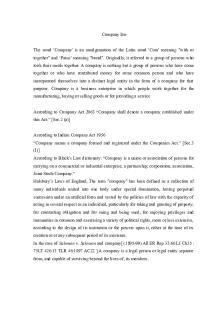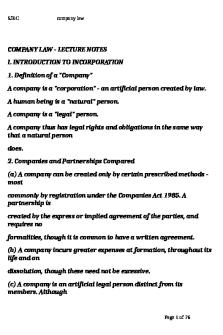Company law revision PDF

| Title | Company law revision |
|---|---|
| Course | Company Law |
| Institution | Nottingham Trent University |
| Pages | 5 |
| File Size | 169.3 KB |
| File Type | |
| Total Downloads | 96 |
| Total Views | 227 |
Summary
Company law revisionTopic Explanation Key legislation Key cases Done aquestionplan?The incorporation conceptThe registration process - Register with companies house-The application for registration (known as Form IN01) will provide certain information, including: name of company the address of the c...
Description
Company law revision
Topic
The incorporation concept
Explanation
The registration process - Register with companies houseThe application for registration (known as Form IN01) will provide certain information, including: • name of company • the address of the company’s registered office. • whether the company is to be public or private; • whether the members’ liability is to be limited or unlimited and, if limited, whether it is to be limited by shares or by guarantee; • if the members’ liability is to be limited by guarantee, then a statement of guarantee must be included; • if the company is to have a share capital, a statement of capital and initial shareholdings must be included; • a statement identifying the company’s proposed officers (i.e. the first director(s) and, if applicable, the first company secretary). If the registrar is happy that everything is met, they will issue a certificate of incorporation upon payment of registration fee Advantages of incorporation- Corporate personality - Limited liability - Perpetual succession - Contractual capacity - Ownership of assets - Transferable shares
Key legislation
s.9 CA 2006- required documents are the memorandum of association, an application for registration, and a statement of compliance. EXTRA MARKS ADD IN: Companies House has stated that it eventually intends for all incorporations to be completed electronically and strongly encourages paperless incorporation via the registration fee, which is notably less for electronic registration than for paper registration.
Key cases
Done a question plan?
-
Floating charges Human rights
Disadvantages of incorporation- Increased formality, regulation, and publicity - Civil and criminal liability
Separate legal personality - This means that the company is regarded by the law as a person.
Salomon case is an important case because: 1. it recognized that a company could legitimately be set up to shield its members and directors from liability; 2. it implicitly recognized the validity of the ‘one-man company’ (i.e. a company run by one person, with a number of dormant nominee members) nearly a century before single member companies could formally be created; and 3. the fact that a person holds shares (even, all the shares) is not enough to create a relationship of agency or trusteeship.
Companies Act 2006 s. 15(1)upon registration a company becomes a separate legal person Companies Act 2006 s. 16(2) .
the use of these phrases was criticized by Lord Neuberger in VTB Capital plc v Nutritek International Corp [2013]).
SLP can be abused so courts can step in and take action in these circumstances - often known as ‘piercing’ or ‘lifting’ the ‘veil’—referring to the ‘corporate veil’ that hides the company’s members and directors from liability
Disregarding SLP under Statute - statute can set aside corporate personality and impose liability on those behind the veil Examples include: • If a public company carries on business, or exercises any borrowing powers, prior to being issued with a trading certificate, then the directors can be made personally liable
Salomon v A Salomon & Co Ltd [1897] AC 22 (HL)Salomon did not create the concept of SLP
s 16(2) of the CA 2006
CA 2006, s 767).
• Where, in the course of winding up/administration a company, it appears that the company has been run with an intent to defraud the creditors (known as fraudulent trading), the court may lift the veil and impose personal liability on any persons who were knowing parties to such conduct
(Insolvency Act 1986, ss 213 and 246ZA, discussed at p 185, ‘Fraudulent trading’).
• Where a company has gone into insolvent liquidation/administration, the directors may be personally liable if they continued trading when they knew, or ought to have known, that there was no reasonable prospect of the company avoiding insolvent liquidation/administration
(known as wrongful trading) (Insolvency Act 1986, ss 214 and 246ZB, discussed at p 186, ‘Wrongful trading’).
Disregarding SLP under the common law courts are reluctant to disregard a company’s corporate personality in the absence of statutory authority. In Adams, the claimants put forward a number of arguments for disregarding corporate personality. All of these arguments failed and the Court strongly reaffirmed the principle in Salomon and indicated that corporate personality will not be lightly cast aside. Controlling directors behaviour
What is a director?- not defined in the CA, but states who is included within the office of a director The broad definition covers persons who have not been validly appointed, but who act as directors (known as de facto (‘in fact’) directors). De facto directors, although not validly appointed, are therefore directors under the Act and subject to the relevant provision
Adams v Cape Industries plc [1990] Ch 433 (CA) Petrodel Resources Ltd v Prest [2013]. s.250 CA- director ‘includes any person occupying the position of director, by whatever name called’ ‘person’ suggests that a director can be a natural person or corporate body
EXTRA MARKS Revenue and Customs Commissioners v Holland [2010], in which the defendant was able to avoid liability through a complex web of fortytwo companies, all of which had one
common corporate director.
Directors general duties • Duty to act within powers & for a proper purpose • Duty to promote the success of the company • Duty to exercise independent judgement • Duty to exercise reasonable care, skill & diligence • Duty to avoid conflicts of interest • Duty not to accept benefits from third parties • Duty to declare to the board interest in proposed (or existing) transactions with the company
s.171 s.172 s.173 s.174 s.175 s.176 s.177 (s.182)
These duties can apply to those who are not eve directors (s.170(2)) Law is developing on the general duties owed by shadow directors
Who do directors woe duties to? - Under common law, it was owed to the company only
s.171- duty to act within the company’s powers (a) the duty to act in accordance with the company’s constitution- needs to act within the companies rules (b) the duty to exercise powers only for the purposes for which they are
CA 2006, s 170(1).
Percival v Wright [1902] Ch 421 (Ch)HELD: Swinfey Eady J held that the directors owed no duties (including a duty to disclose information of the type) to the members, and so the claimants’ claim to have the share purchase set aside failed.
conferred- In breach even if the director believes he or she is acting in good faith for the best interests of the company, if purpose of action was not for a proper purpose
(Bishopsgate Investment Management Ltd v Maxwell [1993] BCC 140....
Similar Free PDFs

Company law revision
- 5 Pages

LAW Revision
- 15 Pages

Company law
- 55 Pages

Company Law - kkkkkkkkkkkkk
- 206 Pages

MCQ Company Law
- 25 Pages

Company Law 2018
- 89 Pages

Company law lecture notes
- 9 Pages

COMPANY LAW -LECTURE NOTES
- 48 Pages

Company Law Outlines
- 67 Pages

Company law Full Notes
- 43 Pages

Company Law Notes
- 32 Pages

Company law notes
- 52 Pages

Media Law revision
- 49 Pages

Family law Revision - Llb
- 53 Pages
Popular Institutions
- Tinajero National High School - Annex
- Politeknik Caltex Riau
- Yokohama City University
- SGT University
- University of Al-Qadisiyah
- Divine Word College of Vigan
- Techniek College Rotterdam
- Universidade de Santiago
- Universiti Teknologi MARA Cawangan Johor Kampus Pasir Gudang
- Poltekkes Kemenkes Yogyakarta
- Baguio City National High School
- Colegio san marcos
- preparatoria uno
- Centro de Bachillerato Tecnológico Industrial y de Servicios No. 107
- Dalian Maritime University
- Quang Trung Secondary School
- Colegio Tecnológico en Informática
- Corporación Regional de Educación Superior
- Grupo CEDVA
- Dar Al Uloom University
- Centro de Estudios Preuniversitarios de la Universidad Nacional de Ingeniería
- 上智大学
- Aakash International School, Nuna Majara
- San Felipe Neri Catholic School
- Kang Chiao International School - New Taipei City
- Misamis Occidental National High School
- Institución Educativa Escuela Normal Juan Ladrilleros
- Kolehiyo ng Pantukan
- Batanes State College
- Instituto Continental
- Sekolah Menengah Kejuruan Kesehatan Kaltara (Tarakan)
- Colegio de La Inmaculada Concepcion - Cebu

